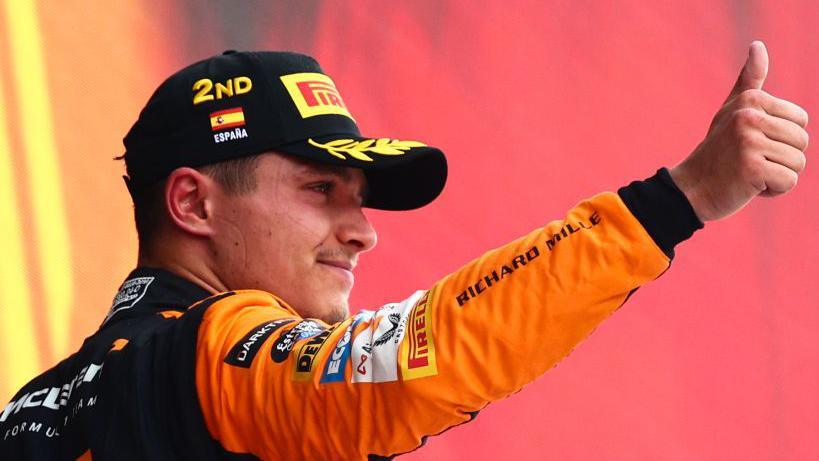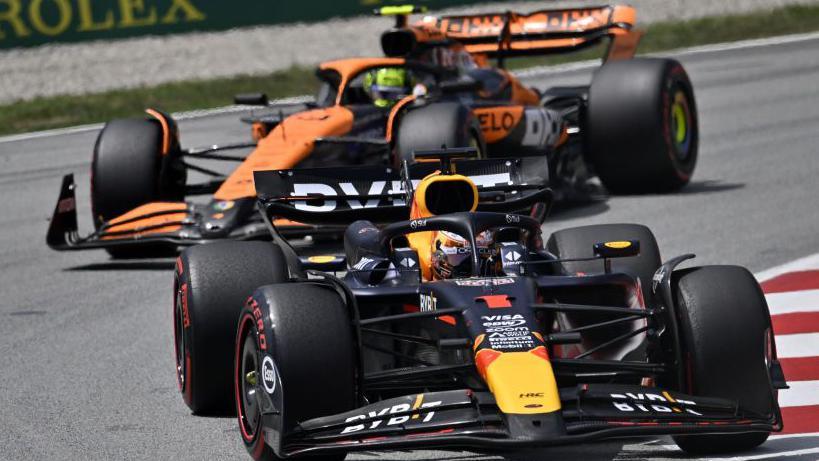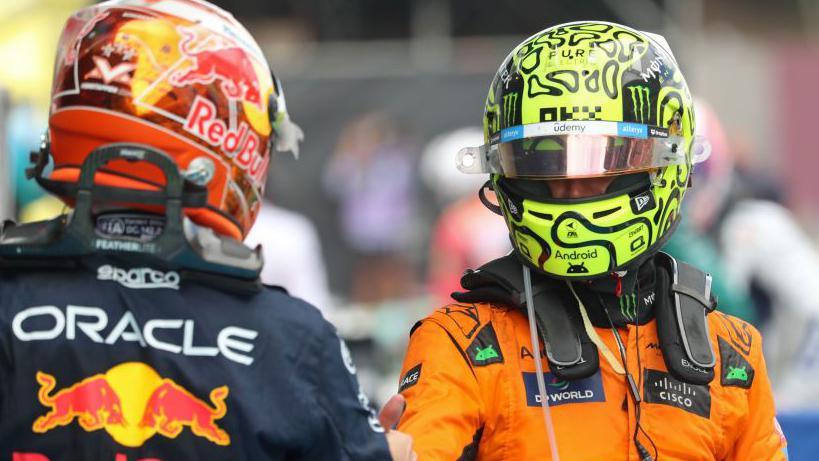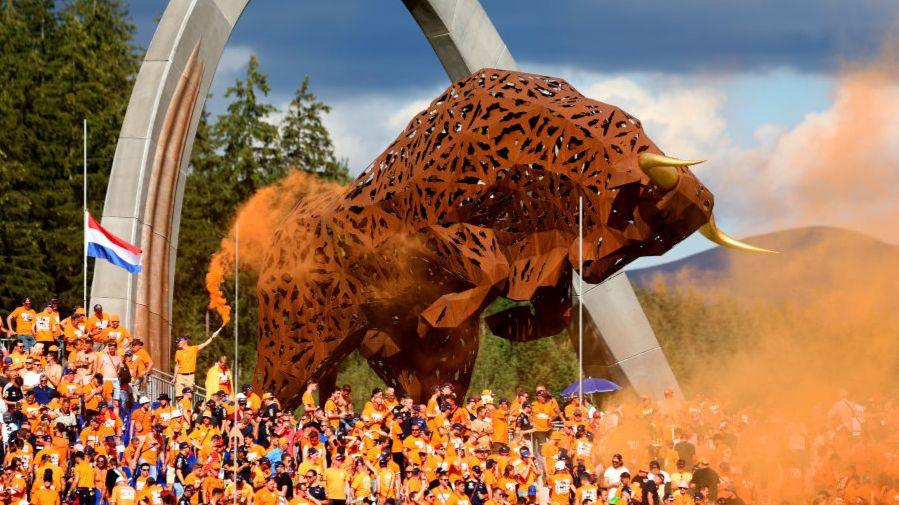Norris 'happy with 99% of things' but needs extra 1% to beat Verstappen

Lando Norris has now finished in the top two in five of the past six races
- Published
Lando Norris still has hopes of challenging Max Verstappen for the Formula 1 title this year despite losing out to the Red Bull driver in a grand prix he felt he should have won for a second consecutive time.
The McLaren driver crossed the line at the end of the Spanish Grand Prix just two seconds behind the world champion.
The rueful agony on his face afterwards reflected the reality that, as Norris himself put it: "I should have done better today."
He added: "We should have got some points back on Max. Potentially there was a chance to beat him in Canada (two weeks ago). Two races I have been second and he has won.
"But Max needs to stop winning. He is still extending it at the minute but we cannot afford to let him run away with it. If I made some better decisions in Canada and had made a better start today, we would have won two races.
"We have what it takes; it’s just about putting it all together."
The result leaves Norris 69 points behind Verstappen. But there are 14 races still to go in this, the longest F1 season in history. A fourth title is Verstappen’s to lose, but if anyone is going to challenge him this year, it looks like being Norris.
Verstappen holds off Norris to win in Spain
- Published23 June 2024
Spanish Grand Prix review
- Attribution
Lacking ‘that 1%’
This was a race decided on fine margins. Norris had taken pole position from Verstappen by just 0.02 seconds. But as the lights went out, Verstappen made a slightly better getaway - enough to have his front wing inside Norris’ rear wheels on the run to the first corner.
Norris did what he could to fend off Verstappen, even forcing him slightly on to the grass on the inside. But he probably knew as soon as the Red Bull was there that the corner was lost.
But what really cost him the race was what happened next. George Russell took advantage of a double slipstream from Norris and Verstappen to sweep his Mercedes around both and into the lead at the first corner, as Verstappen claimed second and Norris braked a little early to avoid being the meat in a Mercedes-Red Bull crash sandwich.
Then, Verstappen passed Russell at the start of the third lap. That allowed Verstappen to build a small lead while Norris, his tyres now too hot for a challenge on Russell, slipped back.
Four seconds - Verstappen’s advantage when Russell pitted out of Norris’ way - is not a big lead. But around the Spanish Grand Prix track, it was enough. McLaren were forced on to an off-set strategy, losing ground by running long before coming back at Verstappen late on in stints.
It's always the hardest way to win a race, and Verstappen - clinical, decisive, measured, perfect - was always likely to have that bit too much.
As Mercedes F1 boss Toto Wolff said: "I think Max always has a little bit in the pocket. You can see he makes the difference."
"I am happy with 99% of things,” Norris said. "It’s just the 1% - which is a big part of it - wasn’t enough today.
"Two metres I lost out in the beginning and this was enough for Max to be on the inside. If George wasn’t on the outside I could have covered him, but George got a good start and got a perfect slipstream, nothing I can do about that.
"As soon as you make one mistake, they are going to be ahead.
"I got a bad start, simple as that, and then I just couldn’t get past George. The car was incredible and we were for sure the quickest, I just lost it at the beginning. Lots of positives, one negative and I know that. I can work on it for next time."
‘I was quite determined to get the lead’

Max Verstappen has won seven races this season to Norris' one
Norris’ performance was a confirmation, as if one were needed, that he and McLaren are now every bit a match for Verstappen and Red Bull.
Since McLaren introduced their big upgrade for Miami at the beginning of May, Norris has won a race and been second three times and fourth once. He is Verstappen’s most consistent challenger, and has been so across a range of circuits that give every reason to suggest it will remain that way.
Norris finished less than a second behind Verstappen in Imola, a race he felt he might have won had a couple of things gone his way. In Canada, had Norris pitted straight away when the first safety car came out, he would have retained the lead, and from there might have won.
And in Spain, but for that start, he could have done so again. Norris could have won three of the past five races.
Instead, Verstappen has that record. And that’s because of his consistent excellence. The move with which he took the lead from Russell was a perfect microcosm of his driving in general - aggressive, assertive, decisive, clean, perfect.
"I was quite determined to get the lead," Verstappen said, "and once I was I could look after my tyres a bit better and that made my race today."
But the fact that the world champion has not been on pole position since Imola, and that three different drivers from three different teams have been, underlines that Red Bull are now facing a challenge that did not look likely at all as they dominated the first five races of the season.
The message has got through to Verstappen loud and clear.
"I would like to win but we need to find more pace," he said. "We can’t aways rely on the perfect strategy and getting everything right at the start. Ultimately you need to be the fastest car on track to keep on winning."
'It's in the detail'

Lando Norris says the next two races, at Austria and Silverstone, are at "two of my favourite tracks"
Norris and Verstappen spent the weekend arguing over who had the fastest car. After qualifying, Verstappen said Norris did, Norris said it was Verstappen. After the race, both felt it was the McLaren.
But Norris’ team principal Andrea Stella was not so sure.
"I think the race pace was very similar," Stella said. "The fact we were faster at the end is because we had fresher tyres. He was faster at the start because we were behind Russell. It looked like parity of performance in qualifying carried over into the race."
For Stella, the key to losing rather than winning was not losing position to Verstappen at the start, but ending up with Russell in between them. Had Verstappen got ahead with Norris in second behind him, Stella said, McLaren would still have done their off-set strategy.
"We were just a little bit too long behind Russell at the start, otherwise the race would have come to us at the end of the 66 laps," Stella said.
"A couple of positions lost at corner one and the time lost behind Russell are the decisive factor.
"If we were behind Verstappen at the start we could have played our cards with good chances."
And Stella said he would not be distracted by Norris’ pessimistic assessment of what might have been.
"The fact he is self-critical is a style," Stella said. "And sometimes we react on the style and not on the content.
"Lando’s start was not bad at all. It was a decent start. He was almost one car ahead of Max but the fact is Russell got the double slipstream of Lando and Max and in corner one Lando was just very wise. A second and your race is gone and we want to stay in the race.
"It’s more in the detail. Very marginal.
"We don’t overreact to the style of Lando being tough with himself. I am sure it is something he will keep fine-tuning over the years.
"Lando just drove very well the entire weekend and if he is upset for a P2 being two seconds from Max then this is really good news for everyone, including F1. Because it means that we have races where with little details, like defending your pole position, we finally can have some different winners than Max."
Norris does not have long to wait to make amends. This weekend, the teams roll into Austria for the second of three races on consecutive weekends. And following that is the British Grand Prix.
Austria was last year the race at which McLaren leapfrogged from the lower midfield to the front with a major upgrade on their car. It was the first evidence of the remarkable turnaround the team have managed under Stella’s considered, emotionally intelligent leadership.
The Red Bull Ring is a track where Norris has always excelled; McLaren, too. And the same goes for Silverstone.
"Austria and Silverstone,” Norris said. "Two of my favourite tracks. We are on a good roll. I just need to tidy up a few bits and then we will be on top."
Related topics
- Published27 June 2024
